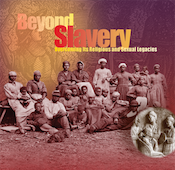Beyond Slavery
Explore the Conference
Explore the Conference by Subject
Slavery in Christian, Jewish, and Muslim Scripture and Religious Law
Christianity, Religion of the Slaveholders and the Enslaved
Sexual Assault and Exploitation Under U.S. Slavery and Jim Crow
How Slavery Has Shaped Our Understandings of Marriage and Friendship
Slavery, Violence, and the State
Beyond Slavery:
Overcoming Its Religious
& Sexual Legacy
Mia Bay:
In Search of Sally Hemings:
Slavery and Sexual Agency in the History of the United States
The story of Sally Hemings, Thomas Jefferson's enslaved lover and mother of six of his children, has gone from scandal to romance to the subject of historical and scientific investigation. All of these approaches misrepresent the liaison between the Founding Father and his female possession because they ignore the sexual exploitation and family losses inscribed across the Hemings family's history and across the history of American slavery. Even discussions that heroically attempt to locate Hemings' own choices, desires and pleasures are doomed because they require us to separate Sally Hemings the woman from Sally Hemings the enslaved woman. That separation was simply inconceivable during her lifetime. Within the context of slavery, property, and power, Hemings had no rights. She had no right to say "no" when she was 13 or 14 and her sexual relationship with Jefferson began, and had no right to say "no" when her children were sold off with the rest of Jefferson's property after his death. Imagining this relationship as a romance reveals our longing for a sexual ethics that includes mutual choice, respect and consent. Jefferson himself may have provided us with the most straightforward and accurate insight into his relationship with Hemings when he described slavery as "a perpetual exercise of the most boisterous passions and the most unremitting despotism on the one part, and degrading submissions on the other."
This video was recorded on October 15-16, 2006 as part of the conference, "Beyond Slavery: Overcoming Its Religious and Sexual Legacy." It was sponsored by the Feminist Sexual Ethics Project in the Near Eastern and Judaic Studies Department at Brandeis University.
